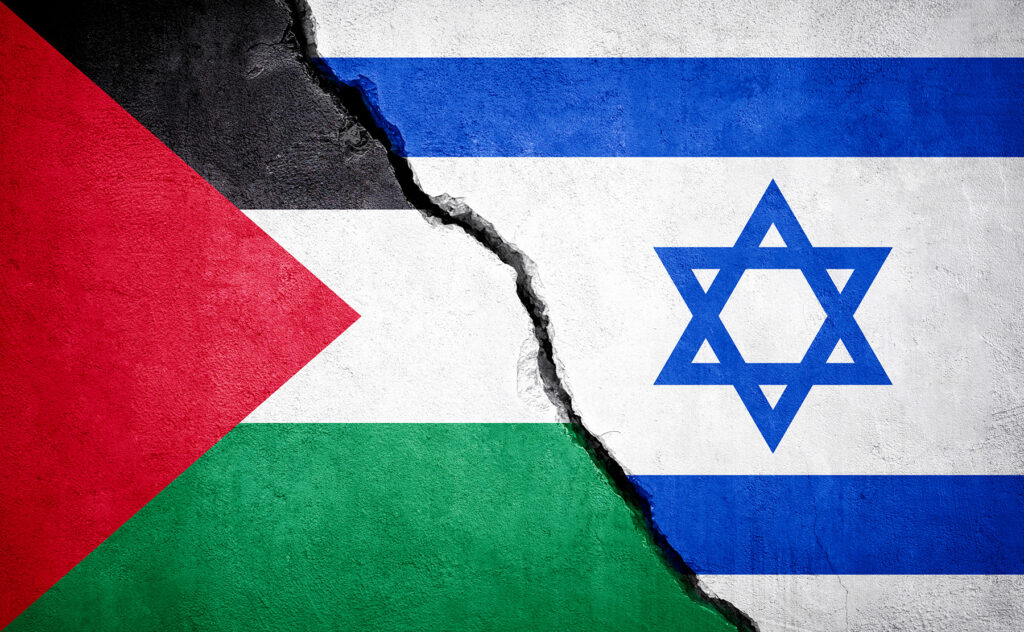Originally posted on June 22 2015
On May 28, a group of Palestinian anti-normalization activists violently disrupted the Jerusalem Hug event, an annual gathering where “Israelis and Palestinians…walk hand in hand around the [Old City] walls” to promote peace in Jerusalem. The organizers justified their actions by claiming they felt “compelled to discipline the normalizers.” According to the Jerusalem Post, the group’s “disciplining” included “throwing water on people, pushing, shoving and assaulting those present.”
This altercation demonstrates the dangers of lingering and one-dimensional assumptions among Palestinians and Israelis, many of whom have chosen to isolate themselves in hopes of living in a simpler, more comfortable, yet fictitious world. In this alternate reality, the views of the other have no validity, their respective narratives exist unchallenged, and any discussion on Palestinian-Israeli issues quickly devolves into a futile competition of narratives and arguments. These kinds of zero-sum conversations only perpetuate the conflict and weaken the chance for a solution.
This worrying trend toward anti-normalization is relatively recent. During the 1980s and 1990s, Palestinians viewed Israelis through the most nuanced and realistic lens of any Arab nation due to their constant personal interactions. Indeed, the biggest surprise when I moved to Ramallah in the late 1990s was how little Palestinians embraced the anti-Israeli stereotypes that were prevalent in the rest of the Arab world. Palestinians had not abandoned their yearning for independence, ended their opposition to the occupation, or developed a love for Israel. Rather, Palestinian society understood the complexities of Israel and remained open to pragmatic compromises regarding a two-state solution.
My experiences as a member of the Palestinian-Israeli peace negotiations also confirmed the necessity of mutual understanding in navigating toward a peace agreement. At first, my view of the Israelis was simplistic. But as I experienced extended dialogue with Israelis, I saw their fears, concerns, hopes, and interests (and yes, hang-ups and dysfunctions) firsthand as they understood them. This mutual dialogue has enriched my personal insight into a conflict that continues to define the Palestinian experience. And while I will never adopt the Zionist narrative—just as I do not expect my Israeli friends to adopt the Palestinian narrative—I now understand that Israelis feel as passionately, as sincerely, and as genuinely about their collective identity as I do about my own.
Yet this acceptance of complex realities is disappearing, in part due to the current realities in Israel and Palestine. Because of border closures and the permit system put into place by Israel after the Oslo Accords, Palestinians and Israelis no longer meet as organically and regularly as they once did twenty years ago. Joint civil society activities, like the Jerusalem Hug event, have become one of the few available avenues for these two societies to explore and understand one another. What is more, anti-normalization efforts aim to close one more pathway for dialogue by intimidating and penalizing Palestinians who wish to engage in cross-cultural, political, or academic activities.
That many Palestinians are now questioning the value of coexistence initiatives is understandable. The lack of a credible peace process, the dwindling prospects of a two-state solution, and Israeli policies in the West Bank and Gaza have greatly weakened the credibility of these initiatives. Nevertheless, the methods and objectives of anti-normalization movement should raise serious concern among Palestinians.
The increasingly direct and sometimes violent methods of anti-normalization activists are aimed at preventing Palestinians from relating to Israelis. They also discourage healthy debate. This movement ignores the Palestinians’ unique and rich history of political diversity and instead seeks to impose the kind of uniformity that has traditionally plagued other Arab societies. Anti-normalization activists have a right to hold their own views, but they should not be able to prevent other Palestinians from dissenting or exercising their right to engage in joint activities with Israelis. Preventing Palestinians and Israelis from interacting directly would deprive the Palestinians—individually and collectively—of the opportunity to gain a deeper, more textured, and ultimately more accurate understanding of Israel.
While the policies of the anti-normalization activists are sadly predictable, the failure of Palestinian Authority (PA) leaders to take a clear stance against them is puzzling. To be sure, standing up to anti-normalization has become politically costly. The PA also faces many other obstacles in supporting advocates of coexistence after years of unfruitful negotiations. But these difficulties cannot serve as an excuse for the PA’s reluctance to confront the anti-normalization movement.
The future of the PA, the Palestine Liberation Organization, and Fatah hinges on reaching a negotiated two-state solution with Israel. When Fatah leaders and PA employees fail to defend the rights of Palestinians who want to engage with Israelis, and when some allegedly become involved in anti-normalization activities, the Palestinian power structure turns on itself. Through these acts, the PA becomes complicit in undermining the very constituency that it will eventually need to rely on in order to achieve a two-state solution, while also denying its people the ability to normalize relations with a neighboring state.
President Mahmoud Abbas has acknowledged the importance of engagement. He makes a point of meeting with Israeli peace activists, which is to be commended. But Abbas also needs to meet with Palestinian peace activists advocating for mutual engagement. This type of symbolic action, coupled with a clear position of support from the PA, is a necessary first step. While verbal support would not stop the anti-normalization movement, it would counter attempts to paint courageous Palestinians who believe in engaging with Israelis as traitors. Such a move by the PA would also give Palestinian peace activists the sense that they are operating within the political mainstream.
Confronting the anti-normalization movement will not solve the Palestinian-Israeli conflict. But if President Abbas and others allow anti-normalization efforts to grow, Palestinians might wake up one day and find themselves without advocates for coexistence and with very little understanding of Israel. This new reality would not only be detrimental for peace, but for Palestine too.
Ghaith al-Omari